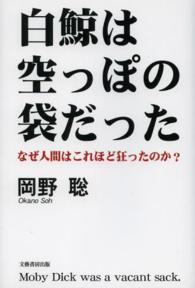- ホーム
- > 洋書
- > 英文書
- > History / World
Full Description
Imagined Ancestries of Vietnamese Communisim illuminates the real and imagined lives of Ton Duc Thang (1888-1980), a celebrated revolutionary activist and Vietnamese communist icon, but it is much more than a conventional biography. This multifaceted study constitutes the first detailed re-evaluation of the official history of the Vietnamese Communist Party and is a critical analysis of the inner workings of Vietnamese historiography never before undertaken in its scope.
In prominence and public visibility second only to Ho Chi Minh, whom he succeeded in the presidency, Ton Duc Thang in fact lacked any real power. Author Christoph Giebel reconciles this seeming contradiction by showing that it was only Ton Duc Thang who could personify for the Party crucial legitimizing "ancestries": those that linked Vietnamese communism with the Russian October Revolution, highlighted proletarian internationalism among its ranks, and rooted the Party in Viet Nam's south. The study traces the decades-long, complex processes in which famous heroic episodes in Ton Duc Thang's life were manipulated or simply fabricated and—depending on prevailing historical and political necessities—utilized as propaganda by the Communist Party. Over time, narrative control over these tales switched hands, however, and since the late 1950s the stories came to be used in factional disputes by competing ideological and regional interests within the revolutionary camp.
Based on innovative archival research in Viet Nam and France and on analyses of biographical writings, propaganda, and museum representations, the study challenges core assumptions about the history of the Vietnamese Communist Part and sheds light on divisions within the revolutionary movement along regional, class, and ideological lines. Giebel uses the fictions and contested facts of Ton's life to demonstrate that history-writing and the constructions of memories and identities are always political acts.
Contents
List of Abbreviations
A Note on Spelling and Translations
Acknowledgments
Introduction
Part One Constructions
1. The Black Sea Mutiny in the Late Colonial Moment
2. The Black Sea Mutiny in the Revolutionary Moment
3. The Black Sea Mutiny in the Post-Recognition Moment
Part Two Contestations
4. Striking Images: Ba Son in the Post-Partition Moment
5. The Secret Labor Union in the Post-Unification Moment
Part Three Commemorations
6. Telling Life: Ton Duc Thang's Official Biography in the Poshumous Moment
7. Museum-Shrine: The Revolution's Guardian Spirit in the Post-Socialist Moment
Conclusion
Notes
Select Bibliography
Index








